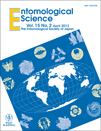
ENTOMOLOGICAL SCIENCE
Scope & Guideline
Bridging Entomology and Ecological Understanding
Introduction
Aims and Scopes
- Biodiversity and Ecology of Insects:
Research exploring the diversity of insect species, their ecological roles, and interactions within ecosystems, including community dynamics and conservation strategies. - Life History and Developmental Biology:
Studies investigating the life cycles, reproductive strategies, and developmental processes of various insect taxa, contributing to our understanding of their adaptations and evolutionary biology. - Behavioral Ecology and Physiology:
Papers examining the behavior of insects in relation to their environment, including foraging, mating, and predator-prey interactions, often focusing on physiological underpinnings. - Taxonomy and Systematics:
Research dedicated to the classification, identification, and phylogenetic relationships among insect species, helping to clarify evolutionary lineages and biodiversity. - Insect-Plant Interactions:
Studies on the relationships between insects and plants, including herbivory, pollination, and the impact of invasive species on native flora and fauna. - Application of Molecular Techniques:
Utilization of molecular methods for species identification, population genetics, and understanding evolutionary processes among insect species.
Trending and Emerging
- Climate Change and Insect Responses:
Research examining how climate change affects insect distributions, life cycles, and interactions with their environment is increasing, reflecting the urgent need to understand ecological impacts. - Molecular Ecology and Genomics:
There is a growing emphasis on molecular techniques, including genomics and environmental DNA, to study insect populations and their genetic diversity, enhancing our understanding of biodiversity. - Insect Conservation and Restoration Ecology:
Studies focusing on conservation strategies for endangered insect species and the restoration of insect habitats are gaining traction, highlighting the importance of insects in ecosystem health. - Urban Entomology:
Research on insect interactions within urban environments is emerging, addressing the challenges posed by urbanization and its effects on insect biodiversity and behavior. - Microbial Interactions with Insects:
Investigations into the relationships between insects and their associated microbiomes are trending, revealing insights into health, behavior, and ecological roles.
Declining or Waning
- Traditional Pest Management Studies:
Research focused on classical pest control methods is becoming less prevalent, possibly due to the rise of integrated pest management and ecological approaches. - Laboratory-Based Studies:
There is a noticeable reduction in studies that rely solely on laboratory settings, as researchers increasingly seek field-based data to understand ecological interactions. - Narrow Taxonomic Focus:
Papers concentrating on very specific insect groups are less frequent, indicating a shift towards broader ecological studies that encompass multiple taxa and their interactions. - Descriptive Studies with Limited Ecological Insight:
Research that primarily describes insect morphology or behavior without contextual ecological implications is waning, as the field moves towards integrative and predictive ecological studies.
Similar Journals
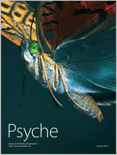
Psyche-A Journal of Entomology
Illuminating the World of Insects Since 1874Psyche-A Journal of Entomology is a distinguished open-access journal published by Hindawi Ltd, specializing in the field of entomology, including aspects of ecology, evolution, behavior, and systematics of insects. Established in 1874, this journal has a rich history of contributing to the scientific community by disseminating high-quality research related to insects and their diverse interactions within ecosystems. With an impact factor placing it in Q3 for both Ecology, Evolution, Behavior and Systematics and Insect Science, Psyche serves as a pivotal platform for researchers, professionals, and students aiming to deepen their understanding of insect-related science. The journal's commitment to open access ensures that research is accessible to a global audience, promoting collaboration and innovation in entomological studies. Covering a broad timeline of converged years from 1874 to 2024, Psyche fosters a comprehensive dialogue around insect biodiversity, conservation, and the ever-evolving dynamics of ecosystems in which insects play crucial roles.

Current Research in Insect Science
Advancing the Frontiers of Insect KnowledgeCurrent Research in Insect Science is a premier journal published by Elsevier, dedicated to advancing knowledge in the field of insect science and its multifaceted applications across ecology, evolution, and behavior. Established in 2021, this journal aims to provide a platform for researchers to disseminate innovative findings that address the ecological significance of insects, their evolutionary processes, and their behavior in diverse environments. With an impressive Q2 ranking in Animal Science and Zoology, Ecology, Evolution, Behavior and Systematics, and Insect Science categories, the journal enjoys a reputable status within the academic community. Its Scopus ranks reflect its impactful contributions to the field, placing it within the top 30% of publications in relevant disciplines. While the journal operates on an open access model, ensuring wide accessibility to research, it remains committed to maintaining rigorous peer-review standards. Researchers, professionals, and students alike will find Current Research in Insect Science an invaluable resource for staying informed on the latest advancements and discussions in insect biology.

Insects
Connecting Researchers in the Vibrant World of InsectsInsects is a prominent open-access journal published by MDPI, dedicated to advancing research in the vibrant field of insect science. Since its inception in 2011, this journal has become a vital resource for academics and professionals alike, also ranked in the prestigious Q1 category within the Insect Science field by Scopus, achieving a remarkable rank of 26 out of 181 journals. With an ongoing convergence period from 2010 to 2024, Insects provides comprehensive coverage of various aspects of entomology, including but not limited to ecology, behavior, physiology, and applied entomology. Based in Switzerland, the journal promotes an open-access model, ensuring that vital research is readily available to researchers, practitioners, and students globally. This journal not only facilitates the dissemination of groundbreaking entomological research but also fosters collaboration and interdisciplinary dialogue in the field.
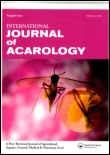
INTERNATIONAL JOURNAL OF ACAROLOGY
Shaping the Future of Acarology ResearchThe INTERNATIONAL JOURNAL OF ACAROLOGY is a leading scholarly journal published by TAYLOR & FRANCIS INC, focusing on the multidisciplinary study of acari (mites and ticks) as well as their ecological and economic impact. With an ISSN of 0164-7954 and an E-ISSN of 1945-3892, this journal has been a pivotal resource since its inception in 1975, now converging into 2024 with an emphasis on high-quality research in the field. The journal currently holds a commendable Q2 ranking in Insect Science within the Scopus database, placing it at the 58th percentile among its peers. This emphasizes the journal’s credibility and relevance in advancing scientific understanding, making it an essential platform for researchers, professionals, and students alike dedicated to acariology and related disciplines. Although it does not provide open access, the journal's scope continues to drive significant discourse and innovation, promoting collaboration and the dissemination of critical findings in agricultural and biological sciences.
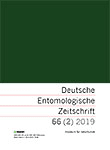
DEUTSCHE ENTOMOLOGISCHE ZEITSCHRIFT
Championing Open Access to Entomological ResearchDEUTSCHE ENTOMOLOGISCHE ZEITSCHRIFT is a premier open access journal dedicated to the vibrant field of entomology, proudly published by Pensoft Publishers. With a rich publication history dating back to 1954, this journal serves as a vital platform for disseminating high-quality research in Animal Science, Zoology, and Insect Science, currently holding a commendable Q2 quartile ranking in these disciplines. The journal embraces the accessibility of science, having transitioned to an open-access model in 2014, ensuring that all readers can engage with cutting-edge findings and innovative studies without barriers. Researchers, professionals, and students alike will find the journal's breadth of topics—ranging from basic ecological studies to applied entomological research—essential for keeping abreast of developments that impact biodiversity and ecosystem functioning globally. With its commitment to supporting the entomological community, DEUTSCHE ENTOMOLOGISCHE ZEITSCHRIFT remains a cornerstone for anyone interested in the intricate world of insects.
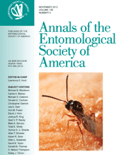
ANNALS OF THE ENTOMOLOGICAL SOCIETY OF AMERICA
Innovating Insights into the World of InsectsANNALS OF THE ENTOMOLOGICAL SOCIETY OF AMERICA is a premier journal dedicated to advancing the field of insect science, published by Oxford University Press. With an impressive impact factor and classified in the Q1 quartile for its category, this journal ranks among the top publications in agricultural and biological sciences, specifically within insect science, positioned at #28 out of 181, indicating its significant influence and high-quality research contributions. The journal aims to disseminate original research, comprehensive reviews, and groundbreaking findings that enhance our understanding of entomology, spanning across ecological, evolutionary, and applied segments. With a consistent publication history since 1938, researchers, professionals, and students will benefit from the wealth of knowledge presented in its pages. Although the journal does not currently offer open access, it remains a vital resource for those seeking to stay at the forefront of entomological research and innovation.

ZHURNAL OBSHCHEI BIOLOGII
Celebrating Over 75 Years of Biological ResearchZHURNAL OBSHCHEI BIOLOGII, published by MEZHDUNARODNAYA KNIGA in the Russian Federation, is a venerable journal with a rich history originating in 1945. Renowned for its contributions to the fields of Ecology, Evolution, Behavior, and Systematics, as well as Medicine (miscellaneous), this journal provides a platform for researchers and professionals to disseminate significant findings within these domains. Although currently not classified as an open access publication, ZHURNAL OBSHCHEI BIOLOGII holds a Q4 quartile designation in its respective categories, reflecting its unique positioning within the global research landscape. While its coverage in Scopus is limited, the journal remains an important resource for academics interested in the evolution of biological sciences, especially within the context of Russian research traditions. By fostering scholarly communication and collaboration, ZHURNAL OBSHCHEI BIOLOGII continues to play a critical role in advancing knowledge in the biological sciences.

Austral Entomology
Unveiling the Secrets of Entomological ScienceAustral Entomology, published by Wiley, is a leading journal in the field of entomology, specializing in the study of insects within the wider context of agronomy, ecology, and evolutionary biology. With an impact factor that reflects its growing influence and a commendable H-Index, this journal serves a vital role in disseminating cutting-edge research that bridges the gap between basic entomological studies and applied agricultural practices. Since its inception in 2014, Austral Entomology has maintained a strong commitment to open access, fostering a collaborative environment for researchers and practitioners. Recognized within category quartiles Q2 across multiple fields such as Agronomy and Crop Science and Ecology, it ranks impressively among journals in Insect Science, showcasing the significance of its contributions to understanding insect behavior, ecology, and systematics. Given its robust accessibility options, the journal not only enhances the visibility of entomological research but also empowers professionals and students alike to engage with and apply findings in real-world contexts.
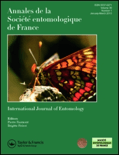
ANNALES DE LA SOCIETE ENTOMOLOGIQUE DE FRANCE
Connecting researchers to the dynamic realm of insects.ANNALES DE LA SOCIETE ENTOMOLOGIQUE DE FRANCE, published by Taylor & Francis Ltd, is a prestigious journal that focuses on the dynamic field of entomology, offering a platform for the dissemination of innovative research related to insect science and ecological systems. With an increasing impact factor and notable quartile rankings (Q2 in both Ecology, Evolution, Behavior and Systematics, and Insect Science), the journal serves as a vital resource for researchers, professionals, and students alike, stimulating advances in our understanding of insect biology and its implications for broader ecological contexts. Although it is not an Open Access journal, it boasts a strong reputation within the academic community, as evidenced by its significant Scopus rankings and a commitment to high-quality peer-reviewed content. With its extensive historical archive since 1988 and a continuous publication schedule through 2024, ANNALES DE LA SOCIETE ENTOMOLOGIQUE DE FRANCE remains an essential reference for those engaged in the study of entomology and related ecological fields. For more information, visit the publisher's site at Taylor & Francis Ltd.
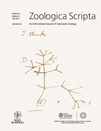
ZOOLOGICA SCRIPTA
Advancing knowledge in animal sciences and ecology.Zoologica Scripta, published by Wiley, stands as a distinguished journal within the fields of Animal Science and Zoology, Ecology, Evolution, Behavior and Systematics, Genetics, and Molecular Biology. With its inception dating back to 1971 and a convergence year extending to 2024, this journal consistently provides a platform for high-quality research, earning a Q1 ranking in two key categories and solid performance in additional fields, as evidenced by its significant Scopus rankings and impressive percentiles. Notably, it ranks 36 out of 490 journals in Animal Science and Zoology, placing it in the 92nd percentile. While Zoologica Scripta operates under a traditional access model, its rigorous peer-review process ensures that only the most impactful studies make their way into its pages. With a focus on advancing our understanding of biodiversity and evolutionary processes, this journal is indispensable for researchers, professionals, and students committed to the ongoing exploration of animal sciences and ecological studies.